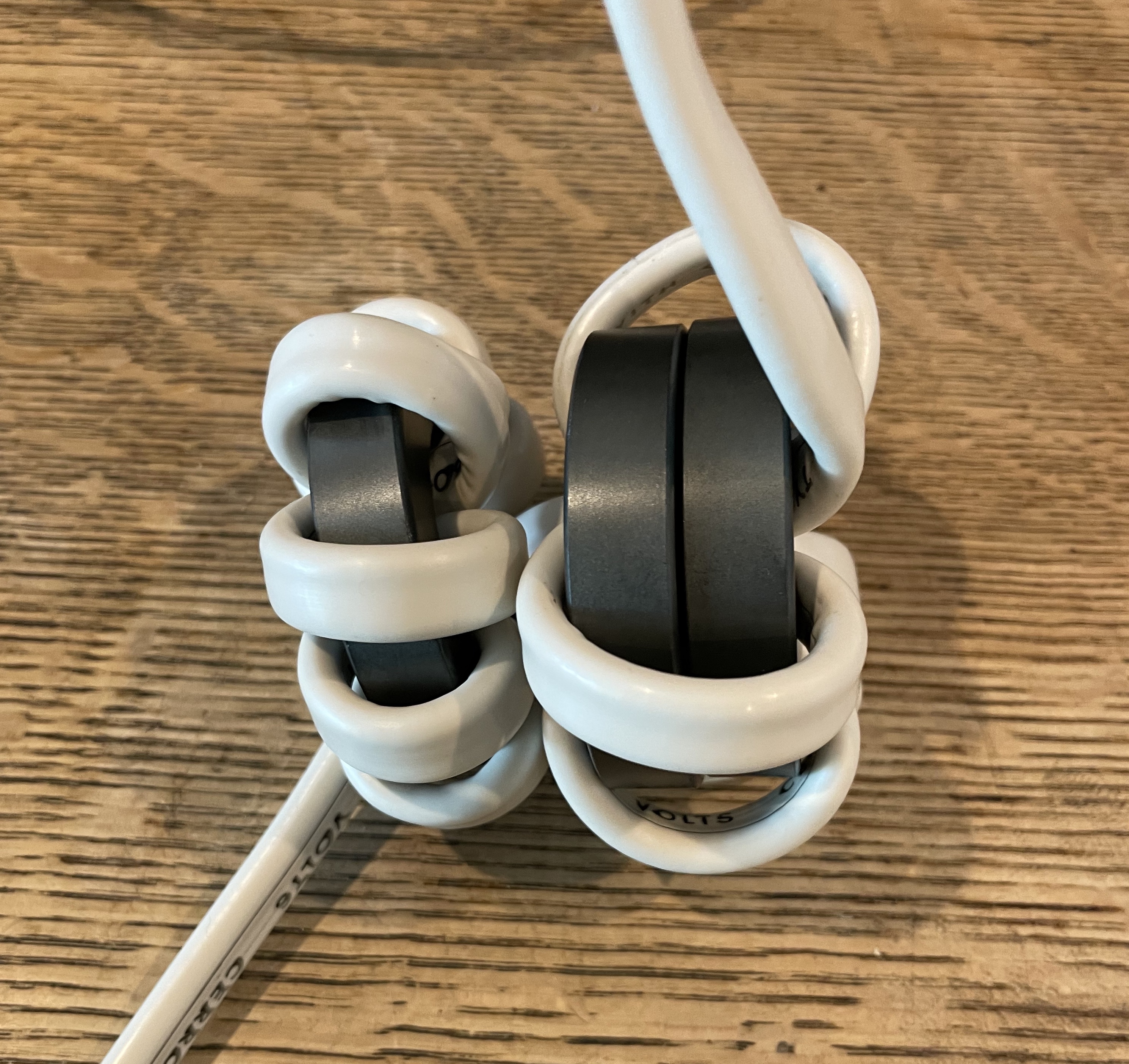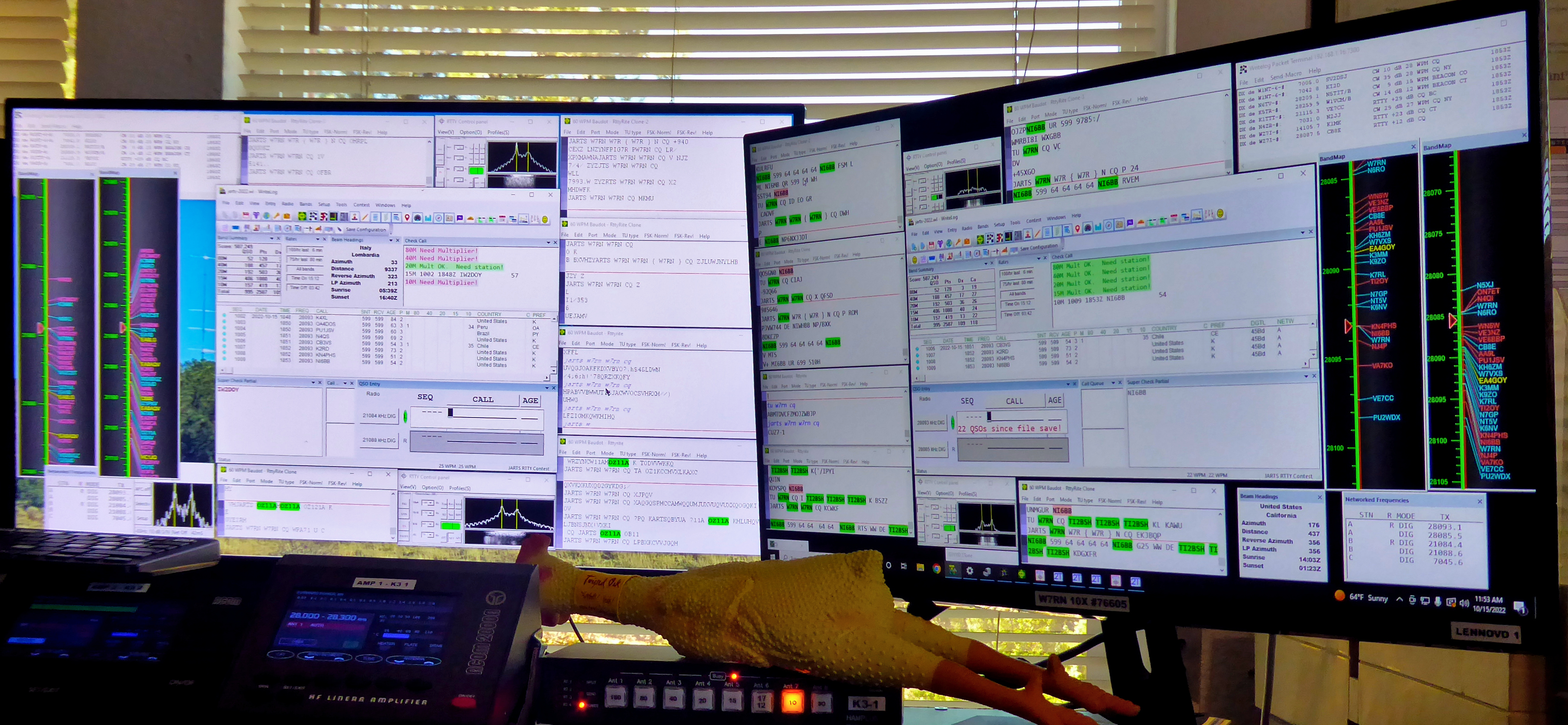 October 26, 2022 Editor: Paul Bourque, N1SFE | |||
In this Issue:
Upcoming Contests -- Things to Do The CQ WW Phone contest is this weekend. It's probably the most popular, with thousands of stations on the air. Though recent conditions have been great on the higher bands, at the time of this writing forecasts say that geomagnetic conditions could be unsettled during the contest. If open, ten meters is great for multipliers -- in this contest, "juicy mults" count separately for each band. Make sure you're providing the right exchange: report and CQ zone. That practically means 59 and 3, 4, or 5 for the mainland US. The Explorer entry category for 2022 "is intended to encourage innovation in operating strategies, station design, and technology adaptation" and may be something to try for a distributed multi-op, because in that category, "members of a multi-operator team are permitted to operate from different locations." The CW leg of ARRL Sweepstakes is November 5 - 7. ARRL Sweepstakes is the "oldest domestic contest, beginning in 1930" with competition at the individual, team, and club levels. In this contest, multipliers are the 84 ARRL and RAC Sections; each may be worked once in the contest, regardless of band. The exchange is daunting to this contest's first-timers, but familiar to those who have operated it before. Contacts may be made on 160, 80, 40, 20, 15, and 10 meters, but because multipliers may only be worked once, activity tends to cluster on the bands that are open and populated. Don't forget: "100 W is now the low-power category limit for all ARRL and IARU HF contests, effective January 1, 2022." Busted QSOs In the last issue, the New York and Illinois QSO parties should have been listed as being on the weekend of October 15. Sorry about that. Contest Summary See the "Contests" section below for complete contest information. October 27, 2022 - November 9, 2022 October 27 October 28 October 29 October 31 November 1 November 2
November 3 November 4 November 5 November 6 November 7 November 8 November 9
News, Press Releases, and Special Interest Contesters and DXers have a similar goal: make contacts as quickly and efficiently as possible. The International DX Association (INDEXA) published DXing tips in their summer newsletter, which were authored by many operators who you would also associate with contesting. The Stew Perry Topband Distance Challenge was last weekend, and the soapbox comments indicate conditions were worse than last year. This would be expected in a time of increasing sunspot activity. Get ready for the main event in December! As more of our gear and software become connected to our in-shack networks and we make our stations accessible remotely, keeping unauthorized users out is of paramount importance. The NodeRED members on Groups.io have published some guidelines that should be followed by anyone considering opening access to their dashboards from the outside. The key is to not open any network ports, or port forward from the outside to the inside. Instead, use a VPN and require authentication. Paul Wade, W1GHZ, has announced that after a 3-year hiatus, the Microwave Update will return in 2023. On April 14 - 15, 2023, the event will return to the Hilton Garden Inn at the Bradley Airport in Windsor, Connecticut. Details for registration and hotel information will be coming soon, at https://microwaveupdate.org. Those with an interest in submitting presentations or papers should email Paul at w1ghz@arrl.org. Word to the Wise Golden Log -- A submitted log judged by the contest sponsor to contain no mistakes. Sights and Sounds
Keeping electromagnetic interference (EMI) out of power lines is important when using generators with radio gear. Jim Brown, K9YC, provides guidance on constructing practical common-mode power-line chokes for this purpose, in his document, "A Ham's Guide to RFI, Ferrites, Baluns, and Audio Interfacing." I recently built a couple of the chokes shown in Fig 30a. If you're building one, you'll need at least 62 inches of Romex-type cable to make one of these with the three cores. In email communication with Jim, he reiterates to not substitute wire type or cores, otherwise you'll be on your own for characterizing the performance of the chokes.
Results and Records Ed Muns, W0YK, notes: "The 2022 WW Digi DX Contest results are now online. Thank you for your patience, as they were delayed." Stu Phillips, K6TU, announces: "The results for the 2022 running of the Makrothen RTTY Contest are now available on the Pizza Lovers 259 website. Personalized certificates are available to all participants. We would like to thank all who took part and congratulate the top scorers in all categories. The 2023 Makrothen RTTY Contest will take place October 14 - 15, 2023." Since the finish of the Stew Perry/LowBand Jack contest last weekend, and as contest logs are submitted, the preliminary results of this contest are frequently updated on the contest website. Scores are updated as new low power and QRP log submissions are made, because those contacts earn a higher multiplier. Larry Tyree, N6TR, notes that "anyone interested in sponsoring a plaque for the December main event is welcome to sign up. Information is available on the website under Plaques." Operating Tip The Logger-Calculated Score is Just an Estimate For any given contest, contacts will be made and logged. The logging program will examine each contact, and to the best of its ability, keep a running total of what your score is in the contest. There are many reasons why the logger's calculated score may not match what the contest sponsor calculates. Even with a golden log (see "Word to the Wise" above), calculating the exact score for some contests is impossible. This is because contests have rules that assign points based on information that the logging program doesn't have. For example, in the recent Stew Perry Topband Challenge, a contact's points are calculated based on the distance between the two stations participating, as well as the power category for each station. The logging program doesn't know how much power the other station is using, so it can't accurately calculate a score for logs containing contacts with QRP, low-power, and high-power stations. Technical Topics and Discussion Cruciform drive screws have a head with two slots crossing. Some screws just have the two slots, some have slots and a dot or two, and sometimes the slots have a different shape where they cross. As long as you have a tool that will turn them, it's ok, right? Well, maybe, maybe not. There are different types, denoted by the markings on the screw heads, and for critical applications, you should always use the right tool for the right screw, especially if you want to avoid cam-out and damaging the slots. It's easy to geek out on this topic, but here's a Wikipedia article that provides a high-level overview of the various types. In a post to the Amps list on lists.contesting.com, Mike Schlamp, W5CUL, noted that there's a Groups.io group dedicated to the Alpha 87A amplifier. Alpha RF Systems has a web page on these amplifiers that offers a wealth of technical information, as well as production dates for many legacy Alpha amplifier models. Harvey Mudd College has published the video lecture series, "Learn SDR with Professor Jason Gallicchio," on YouTube. The series of lectures are highlighted by demonstrations of the theory with actual RTL-SDR hardware. The lectures start with FM reception and proceed through on-off keying, phase-shift keying (PSK), doppler radar, digital symbol recovery, and GPS reception. The RTL-SDR receiver is an inexpensive USB-based receiver that was originally intended for DVB-T (Digital Video Broadcasting-Terrestrial) reception, but now finds application in hundreds, if not thousands, of SDR-related projects. A number of university researchers have figured out how to use Starlink signals as an analog for GPS. They did so by decoding Starlink signals and reverse engineering the data streams. One of the teams from Ohio State University has gone even farther, constructing a framework they're calling cognitive opportunistic navigation, which will observe and decode arbitrary signals from an orbiting satellite to be able to accurately determine the receiver location on Earth. Conversation Sustainable Contesting Becoming a better operator usually refers to becoming more skilled at the techniques of contesting. The human operator is part of the signal chain -- becoming and maintaining a healthier human is something that can translate into better contest scores. There's no quick pill for this one, and some of the most important skills are boring, like getting more and better sleep, eating appropriately, and exercising regularly. Sitting for 12, 24, or 48 hours during a contest has a negative impact, but you can take advantage of the time between contests to counteract those effects. Maintaining the human can lead to a longer life, and therefore more contests. Isn't that what it's all about? That's all for this time. Remember to send contesting-related stories, book reviews, tips, techniques, press releases, errata, schematics, club information, pictures, stories, blog links, and predictions to contest-update@arrl.org. 73, Brian, N9ADG Contests October 27, 2022 - November 9, 2022 An expanded, downloadable version of QST's Contest Corral is available as a PDF. Check the sponsors' website for information on operating time restrictions and other instructions. HF CONTESTS CWops Test (CWT) , Oct 27, 0300z to Oct 27, 0400z; CW; Bands: 160, 80, 40, 20, 15, 10; Member: Name + Member No./"CWA", non-Member: Name + (state/province/country); Logs due: Oct 29. VHF+ CONTESTS VHF-UHF FT8 Activity Contest , Nov 2, 1700z to Nov 2, 2100z; FT8; Bands: 144 MHz; 4-character grid square; Logs due: Nov 7. VHF-UHF FT8 Activity Contest , Nov 9, 1700z to Nov 9, 2100z; FT8; Bands: 432 MHz; 4-character grid square; Logs due: Nov 14. Log Due Dates October 27, 2022 - November 9, 2022 October 27 October 28 October 29 October 30
October 31
November 1 November 2
November 3 November 4 November 5 November 6 November 7 November 8 November 9 ARRL Information Click here to advertise in this newsletter, space subject to availability. Your One-Stop Resource for Amateur Radio News and Information ARRL membership includes a choice of one print magazine: QST, the monthly membership journal, or On the Air, ARRL's new bimonthly publication for beginner and intermediate hams. All ARRL members can access all four ARRL magazines - QST, On the Air, NCJ, and QEX - digitally. Subscribe to NCJ - the National Contest Journal. Published bimonthly, it features articles by top contesters, letters, hints, statistics, scores, NA Sprint, and QSO Parties. Subscribe to QEX - A Forum for Communications Experimenters. Published bimonthly, it features technical articles, construction projects, columns, and other items of interest to radio amateurs and communications professionals. Free of charge to ARRL members: Subscribe to The ARRL Letter (weekly digest of news and information), the ARES Letter (monthly public service and emergency communications news), Division and Section news, and much more! ARRL offers a wide array of products to enhance your enjoyment of Amateur Radio. Visit the site often for new publications, specials, and sales. Donate to the fund of your choice - support programs not funded by member dues! Reprint permission can be obtained by emailing permission@arrl.org with a description of the material and the reprint publication. Acknowledgements ARRL Contest Update wishes to acknowledge information from WA7BNM's Contest Calendar. | |||








